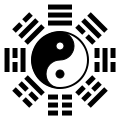This article needs additional citations for verification. (November 2017) |
| Part of a series on |
| Taoism |
|---|
 |


The Great Emperor of the Curved Array[a] (Chinese: 勾陳大帝; pinyin: gōuchén dàdì), also called the Gouchen Emperor and Tianhuang Emperor, is one of the highest sky deities of Taoism. He is one of the Four Sovereigns (四御; sì yù) and is in charge of heaven, earth, and human and of wars in the human world.[1]
Chinese mythology
[edit]The "Curved Array" is a constellation in the Purple Forbidden enclosure, equivalent to the European constellation called Ursa Minor or the Little Dipper. In Taoism, the Great Emperor of Curved Array is the eldest son of Doumu and the brother of the Ziwei Emperor.[citation needed]
History
[edit]Emperor Gaozong of Tang was called by the title Emperor Tianhuang as his Posthumous name given by Wu Zetian. Liu Yan was also given the posthumous name.[citation needed]
Constellation
[edit]There is a constellation named after the Tianhuang Emperor.
See also
[edit]Notes
[edit]References
[edit]- ^ (in Chinese) – via Wikisource.
External links
[edit]- 道教文化资料库 (in Chinese)
- 玉皇大帝 (in Chinese)
- 后土皇地祇-地母元君 (in Chinese)

